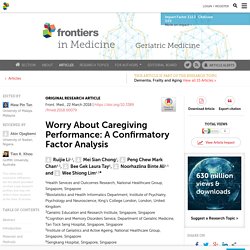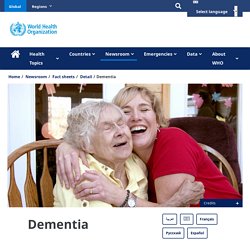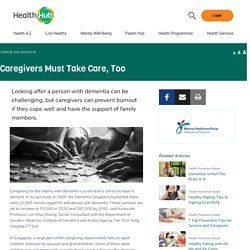

Therefore, caregivers taking care of a Person with Dementia (PWD) often face high level of stress. In this resource centre, we will share some information on how to cope with stress while taking care of a PWD. Caregiver Stress - How to prevent burnout and deal with fatigue? -SeniorCare – Singapore's Most Reliable Online Elderly Store. Caretakers in Singapore face a tough and daunting tasks. Not only do they have to shoulder the physical work of taking care, they also face huge mental challenges in facing numerous problems in Singapore. You may become a caregiver (or caretaker) as your parents or elder relatives start to age, and their physical, mental and emotional state gradually changes.
It is a challenging part of our lives not just for the elderly but for the other family members as they started to learn how to be caregivers and take on new chores in the family. There is a recent study by Tan Tock Seng Hospital – Institute of Geriatrics and Active Ageing that reveals that 40% to 60% of caregivers of people with dementia suffer from significant stress. Caregiver syndrome or caregiver stress Taking care of your loved ones, whether out of love or out of obligation, who are chronically ill or disabled can eventually change your life. Indeed, long-term caregiving situation is an overwhelming task. In-home respite. Worry About Caregiving Performance: A Confirmatory Factor Analysis. Introduction Dementia is a disease that is frequently associated with significant caregiving burden.

One of the most widely used instruments to quantify caregiving burden is the Zarit Burden Interview (ZBI) (1). The ZBI has been validated in different populations and has been shown to be invariant across different educational levels and gender (2). The degree of caregiving burden has traditionally been assessed using pre-defined cutoffs on the ZBI total score, essentially constituting a unidimensional approach (3, 4). Subsequent studies have since pointed toward caregiving burden as a multidimensional construct. Of note, a factor has consistently emerged in recent studies, known variously as: “self-criticism” (9, 10, 12), “guilt”(13–15), “feelings of inadequacy” (16, 17), and “worry about performance” (7, 8).
The relationship between WaP with various socio-demographic and diseases characteristics is hitherto not well understood. Materials and Methods Study Design and Participants. ZBI. Dementia. Dementia is a syndrome – usually of a chronic or progressive nature – in which there is deterioration in cognitive function (i.e. the ability to process thought) beyond what might be expected from normal ageing.

It affects memory, thinking, orientation, comprehension, calculation, learning capacity, language, and judgement. Consciousness is not affected. The impairment in cognitive function is commonly accompanied, and occasionally preceded, by deterioration in emotional control, social behaviour, or motivation. Dementia results from a variety of diseases and injuries that primarily or secondarily affect the brain, such as Alzheimer's disease or stroke. Dementia is one of the major causes of disability and dependency among older people worldwide. Signs and symptoms Dementia affects each person in a different way, depending upon the impact of the disease and the person’s personality before becoming ill. Forgetfulnesslosing track of the time becoming lost in familiar places. Human rights. Relaxation Techniques for Stress Relief. To effectively combat stress, you need to activate your body’s natural relaxation response. Techniques such as deep breathing, visualization, meditation, and yoga can help.
Finding the best relaxation technique for you For many of us, relaxation means flopping on the couch and zoning out in front of the TV at the end of a stressful day. But this does little to reduce the damaging effects of stress. Rather, you need to activate your body’s natural relaxation response, a state of deep rest that puts the brakes on stress, slows your breathing and heart rate, lowers your blood pressure, and brings your body and mind back into balance.
Caregivers Must Take Care, Too. Caregiving for the elderly with dementia is a role that is set to increase in demand.

In its last study in 2005, the Alzheimer’s Disease Association Singapore found that there were 22,000 seniors (aged 65 and above) with dementia. These numbers are set to increase to 53,000 in 2020 and 187,000 by 2050, said Associate Professor Lim Wee Shiong, Senior Consultant with the Department of Geriatric Medicine, Institute of Geriatrics and Active Ageing, Tan Tock Seng Hospital (TTSH). In Singapore, a large part of the caregiving responsibility falls on adult children, followed by spouses and grandchildren. Some of these adult children may not necessarily provide direct care but they are the decision-makers.
Many of these adult caregivers are also sandwiched between having to look after their parents with dementia and their own children. Related: Dementia Role Reversal: Who is the Carer Now? Stressing About Stress This is salient among Asians because of our emphasis on filial piety. Untitled. Agency for Integrated Care - AIC Singapore - Accueil. Alzheimer's Disease Association – Home of the ADA.